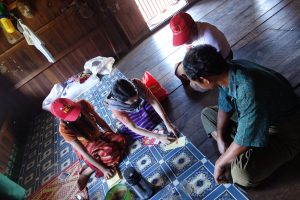In just under two weeks, voters in Myanmar will cast their ballots in the country’s second free election since the end of military rule in 2011. The overall result is in little doubt. State Counselor Aung San Suu Kyi, Myanmar’s de facto ruler and the head of the ruling National League for Democracy (NLD), is widely expected to win a second term in office, following her party’s lopsided victory in 2015.
The election is set play an important role in definitively inducting Myanmar, once a byword for dictatorship and repression, into the ranks of the world’s electoral democracies. But according to a new report from the International Crisis Group (ICG), structural flaws in Myanmar’s electoral system mean that the polls will leave unresolved the ethnic inequities that have driven decades of civil conflict.
The ICG report, released on October 22, argues that Myanmar’s electoral system concentrates political power in the hands of the military and the Burman majority, a major driver of Myanmar’s history of armed conflict. Specifically, it cites the concentration of parliamentary seats in the central Burman regions and a military-drafted constitution that allows the army to appoint a quarter of the parliament, giving it a de facto veto over constitutional amendments.
Add on top of this a first-past-the-post electoral system that is “particularly ill-suited to Myanmar demographics,” and the upcoming election is unlikely to translate to sufficient representation for ethnic minority groups. As a result, the ICG report argues, “the results will likely amplify disaffection with electoral politics among minorities and could in turn stoke the country’s numerous armed conflicts.”
These inequities have only been compounded by the COVID-19 pandemic. Aung San Suu Kyi and the Union Election Commission (UEC) have resolved to push forward with the elections on November 8, despite an alarming spike in infections. The consequent restrictions, which include bans on public rallies, have tended to benefit the NLD at the expense of smaller parties, including many ethnic minority-based parties.
The situation is particularly fraught in Rakhine State in Myanmar’s west, where an ongoing armed conflict between the military and the insurgent Arakan Army (AA) has led to the cancellation of elections in more than half of the state. As a result, around 1.1 million people in Rakhine State will be unable to participate on November 8, in addition to voters in other conflict-torn parts of the country. As I noted last week, the cancellations are less of a problem than the perception that they have been imposed unevenly and inconsistently by the UEC, and to the benefit of the NLD.
This comes in addition to more than a million Muslim Rohingya who have been denied the right to vote on the grounds that they are illegal immigrants, even though some claim to have lived in the country for generations. Among them are the 750,000 or so Rohingya civilians who have been driven into Bangladesh by the Myanmar military since 2016, and several hundred thousand more who more remain in internal displacement camps in Rakhine State. As the ICG report concludes, “Rohingya disenfranchisement, and the armed conflicts in Rakhine State and elsewhere that have led to poll cancellations, will also mar the elections’ credibility for the communities concerned as well as international observers.”
As a result, even in the best case scenario, the outcome of the election could be end up undermining the broader goal of peace. “If minority people lose faith in electoral politics,” it concludes, “some will be more likely to resort to insurgency, putting further strain on an already moribund peace process.”
The report offers a further reminder that electoral democracy was only a partial salve to Myanmar’s complex problems: a necessary, but not sufficient, condition for a lasting peace.
According to the ICG, there are a few obvious ways that the worst impacts of the present system could be ameliorated over the longer term. It calls for amendments to the electoral system in order to balance it away from the lopsided focus on Burman-majority regions of the country, and for amending the constitution to end the military’s political role. It also calls on the new government to appoint ethnic party leaders to head local administrations in minority areas, rather than flying in appointees from the Burman heartland.
But all of these changes would require the government and the military to jettison a view of Myanmar identity that places Burman myths, precepts, and symbols at its core. Anything short of this will simply perpetuate a long history of ethnic Burman domination, legitimized now by a popular mandate.

































